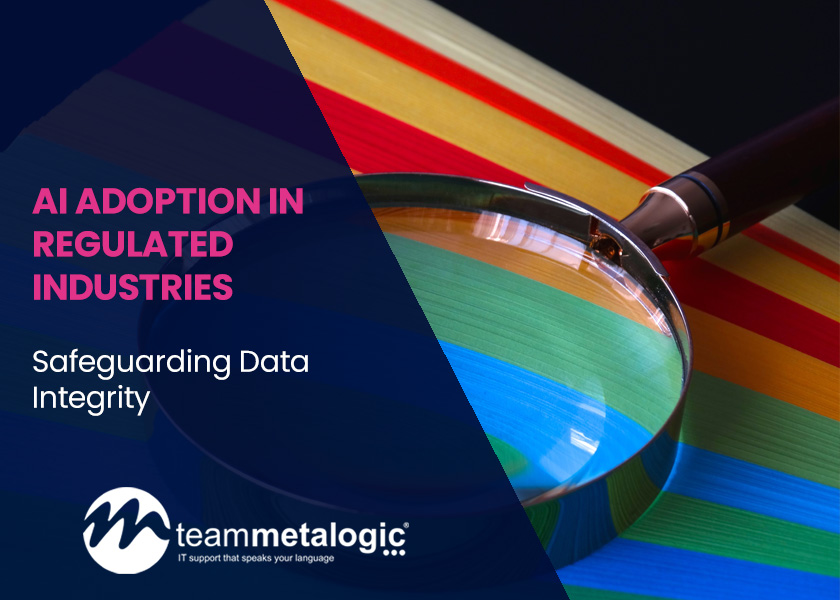AI’s Role in Regulated Industries
In the ever-evolving landscape of regulated industries, the adoption of Artificial Intelligence (AI) has emerged as a transformative force. From healthcare and finance to legal services, AI has brought about unprecedented advancements in efficiency and decision-making. However, in these highly regulated environments, maintaining data integrity is paramount. In this article, we explore the significance of data integrity in regulated industries, the role of AI in upholding it, and the challenges and strategies associated with this critical aspect of compliance.
The Significance of Data Integrity
Data integrity refers to the accuracy, reliability, and consistency of data throughout its lifecycle. In regulated industries, data integrity is more than a best practice; it’s a legal and ethical imperative. The data generated, stored, and processed in sectors such as finance, healthcare, and legal services often includes sensitive and confidential information.
Data integrity serves several vital purposes:
- Patient Safety in Healthcare: In healthcare, data integrity ensures that patient records are accurate and complete, preventing medical errors that can have life-threatening consequences.
- Financial Transparency: In the financial sector, data integrity is essential for maintaining transparency and preventing fraud, money laundering, and insider trading.
- Legal Accountability: Legal services rely on accurate data for case research, contract management, and compliance with legal standards. Any discrepancy can have legal consequences.
- Regulatory Compliance: Regulatory bodies, such as the Financial Conduct Authority (FCA) or the General Data Protection Regulation (GDPR & UK GDPR), mandate strict data integrity standards. Non-compliance can lead to substantial fines.
AI’s Role in Upholding Data Integrity
AI plays a significant role in upholding data integrity in regulated industries. Here’s how:
- Data Validation: AI algorithms can automatically validate data inputs for accuracy, consistency, and completeness, flagging any discrepancies or anomalies.
- Data Cleansing: AI-driven data cleansing tools can identify and rectify errors or inconsistencies in datasets, ensuring that only accurate data is used for decision-making.
- Real-time Monitoring: AI systems continuously monitor data flows and alert administrators to any deviations from established data integrity standards, enabling rapid corrective actions.
- Fraud Detection: In finance, AI-powered fraud detection algorithms analyse transaction data to identify potentially fraudulent activities and safeguard financial data integrity.
- Healthcare Diagnostics: AI assists in medical diagnostics by cross-referencing patient data with clinical knowledge, reducing the risk of errors in patient records and medical diagnoses.
- Legal Research: Legal AI platforms use natural language processing to extract and analyse legal information from documents, helping legal professionals ensure data accuracy in their cases.
Challenges in Maintaining Data Integrity with AI
While AI offers significant advantages in upholding data integrity, it also presents challenges:
- Data Bias: AI algorithms can inherit biases present in training data, potentially leading to biassed decisions. This is a critical concern in regulated industries where fairness is paramount.
- Algorithmic Transparency: The “black-box” nature of some AI models can make it challenging to explain the rationale behind AI-driven decisions, raising concerns about accountability and compliance.
- Data Privacy: Handling sensitive data in AI applications requires strict adherence to data protection regulations, such as GDPR. Ensuring data privacy while using AI can be complex.
- Security Threats: AI systems can be vulnerable to cyberattacks and adversarial attacks that aim to compromise data integrity. Protecting AI systems from such threats is essential.
Strategies for Maintaining Data Integrity in AI Adoption
To overcome the challenges and ensure data integrity in AI adoption, regulated industries can employ the following strategies:
- Diverse and Representative Training Data: Ensure that the training data used for AI models is diverse, representative, and free from biases. Regularly audit and update training datasets to maintain accuracy.
- Algorithmic Transparency: Use explainable AI models that provide transparency into the decision-making process. This is particularly important in highly regulated industries where accountability is crucial.
- Data Encryption: Employ robust data encryption protocols to protect sensitive data throughout its lifecycle, from collection to storage and transmission.
- Continuous Monitoring: Implement continuous monitoring systems that track data flows and AI model performance in real-time, promptly identifying and addressing any anomalies.
- Ethical AI Frameworks: Develop and adhere to ethical AI frameworks that guide the use of AI in regulated industries, emphasising fairness, transparency, and data privacy.
- Cybersecurity Measures: Strengthen cybersecurity measures to protect AI systems from potential threats, ensuring data integrity is not compromised.
What next?
AI’s integration into regulated industries offers immense potential for innovation and efficiency. However, the stakes are high, given the sensitive and confidential nature of the data involved. Maintaining data integrity is not merely a best practice; it’s a legal and ethical imperative.
AI plays a pivotal role in upholding data integrity by validating data, cleansing datasets, and ensuring real-time monitoring. Despite the challenges, organisations can implement strategies such as diverse training data, algorithmic transparency, data encryption, and continuous monitoring to safeguard data integrity.
In a world where data integrity is paramount, the synergy between AI and regulated industries has the potential to revolutionise decision-making, enhance patient safety, ensure financial transparency, and uphold legal accountability—all while meeting the stringent standards of data integrity set by regulatory bodies.

